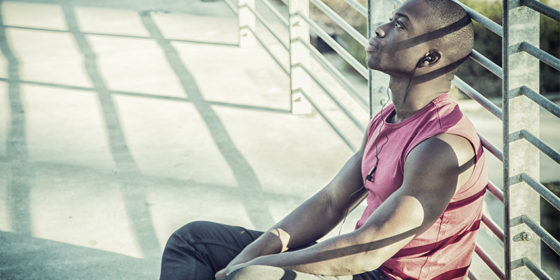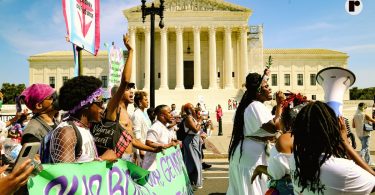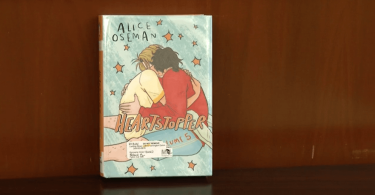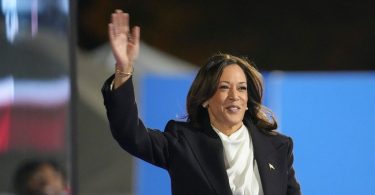Is it true what they say about black men – that we kick ass on the court and kill it in bed? According to messages that constantly pop up in my Grindr inbox, the latter, in particular, must be a definite definitely.
‘Blacks rule whites drool’
I love a good rhyme scheme, but I can’t stop myself from cringing when I think about that one. Should I take it as a compliment? The general consensus about compliments seems to be this: Take them and run.
‘Who needs lust like that?’
Usually, I would, especially if said compliment singled out some personal detail that applies specifically to me: my eyes, my smile, my way with words. But praise that revolves around my race doesn’t single out anything that doesn’t apply to millions of other men.
Maybe the person paying me the alleged compliment is so blinded by my black that he hasn’t even noticed my eyes or my smile. Who needs lust like that?
This isn’t just about my objection to putting people into boxes labeled with colors or the myth about black men that has become the bane of my gay existence. I’m sure the whites who drool are doing it because size matters, but I had my say on that subject in my book Is It True What They Say About Black Men?: Tales of Love, Lust and Language Barriers on the Other Side of the World.
Today I’m looking at an even bigger picture and wondering why black and sex seem to be so intrinsically linked to many non-blacks, even ones who would never dare to utter anything as crude as, ‘Blacks rule whites drool.’
‘Is that all there is to us to them: our sex?’
Why must seeing a black man almost exclusively and unfailingly inspire sexual thoughts in some white minds? Is that all there is to us to them: our sex?
I know everyone gets objectified regardless of skin color, but I wonder if the objectification of white men ever makes blatant mention of the color of their skin. Does any white guy have to keep collecting ‘compliments’ for his entire race?
All the blanket black appreciation doesn’t betray even a hint of discerning selection. It’s like any black man would satisfy all chocolate cravings.
Here’s a general rule of thumb that has nothing to do with my sense if individuality: If replacing ‘black’ with ‘white’ in any racially charged supposed compliment would make it pretty much universally offensive, don’t say it.
Could anyone get away with ‘Whites rule blacks drool’? So why is it acceptable to say the reverse?
Come to think of it, would any blanket statement that places white physicality above black physicality be considered not politically incorrect? Even if it were true, would ‘White don’t crack’ ever actually fly?
How to get away with murder
The more I think about black, white, and red-hot sex, the more I think about that uncomfortable scene in a first-season episode of How to Get Away with Murder. During an argument, the white husband of Viola Davis’s Annalise Keating character furiously admits that the crux of their 20-year relationship has always been the fact that to him, she’s just a piece of ass.
Given the black and white context of the dramatic twist (Annalise has just confirmed that Mr. Keating, a college professor, was screwing a white co-ed who was pregnant with his baby at the time of her murder), it’s a shocking moment of interracial truth.
In this page ripped from the diary of a mad black woman, Annalise assumes the role of the sexually objectified, just like it used to be for many black female slaves on the cotton plantations.
Azealia vs. Iggy
I don’t know if Azealia Banks watches TV, but if she’s into Murder, God only knows what went through her mind when she saw that scene.
Several years ago (in December of 2014, to be exact), she tweet-attacked white people, singling out her fellow rapper Iggy Azalea, for failing to see black men as anything more than a piece of (XXL) dick. While I tsk-tsked Azealia’s lack of Twitter etiquette, she did make some interesting points during her explosion of black rage.
For those who have already forgotten, Iggy was 2014’s breakout white female rapper from Australia whose musical posturing co-opted black culture more flagrantly than Elvis Presley’s ever did.
Oh, and she was dating a black man (NBA star Nick Young, later her fiancé, eventually her ex). The state of deteriorating black-and-white relations in the US and Iggy’s romantic status sparked Azealia’s rant.
its [sic] funny to see people Like Igloo Australia silent when these things happen… Black Culture is cool, but black issues sure aren’t huh?
If you’re down to ride with us bitch you gotta RIDE ALL THE WAY. Don’t just be down to ride Black D — k….. If you with us you WITH US!!!!
While I wouldn’t presume to know what social causes Iggy privately supported back when Black Lives Matter was just gaining steam (for activism does not necessarily need to be loud and public to be legit), I can see where Azealia was coming from.
Her sentiment echoes one of my biggest problems with color-coded and sex-obsessed admiration from gay white men. They just don’t get it… or us.
Blessed?
A guy in Tel Aviv actually once told me that I’m blessed to be black. Um, really? I wouldn’t have it any other way, but it hasn’t been exactly a ‘blessing.’ That misguided Israeli comes immediately to mind every time I consider the horny and the clueless.
I’m not saying that white people need to embrace black culture to the extent that they live it more than I do.
I’m not saying they have to assume black history as their own, though a white American who’s dating a black person probably should have at least heard of the Harlem Renaissance, even if he or she can’t name one prominent black artist from the period.
Change the record
I’m not saying they have to take a pre-determined stance on white cops killing unarmed black men in the United States.
I’m not even saying they have to listen to rap and R&B. After all, I was raised on country and came of age with rock & roll.
What I am saying is that it’s time to change the broken record. Give us recognition for something more than physical.
Black male fantasy
We’re not just about sports prowess either. Some of us, like me, can barely throw a ball. Countless times, taxi drivers all over the world have asked me if I’m a basketball star back home because, presumably, being tall and black can mean only that.
Years ago, I was running late for work in New York City. Determined to catch the next elevator to the 31st floor in the Time & Life building, I leaped inside just before the door closed.
‘Basketball star!’ an impressed colleague said.
I rolled my eyes hard. Basketball star? Just because I managed to get inside an elevator before the door closed?
I didn’t see the connection, but I was absolutely certain my colleague wouldn’t have made it if a white colleague had made that leap of faith.
In the eyes of some, black equals sports, especially basketball, just as much as it equals size and sex. Welcome to the Robert Mapplethorpe black male fantasy. At least the late gay photographer dressed his best-known black piece of meat in a polyester suit and not basketball gear.
But the implication remains the same. Constantly singling us out for the same superficial things implies there is nothing else worth noting about us. I happen to know there’s so much more to me.
So-called ‘compliments’
Gay men who aren’t black betray their narrow view of us every time they drop a ‘compliment’ that ties our sex appeal to the color of our skin. They pop up everywhere, especially in countries where blacks are few and the white locals insist racism and racial profiling isn’t a thing. Newsflash: It always is.
Exhibit A: Excerpts from my Grindr inbox in Belgrade, Serbia



 ‘We (whites) are a gift for you’?
‘We (whites) are a gift for you’?
Can I exchange my ‘gift’ for something else, please?
To expect us to take those sexually/racially charged compliments and run (into the bed of the white people who offer them), to suggest that we should not want to be appreciated for more, to suggest that we should be glad that white people are noticing us in the first place, can be as bad as being ignored entirely.
How far we haven’t come in the 66 years since Ralph Ellison meticulously outlined the darkest side of blackness in his novel Invisible Man. The truth is that black remains as see-through as it ever was. We’ve never been more noticeable, but that doesn’t mean we’ve ceased being invisible.
A version of this column first on Medium – reprinted with permission. Jeremy Helligar’s book, Is It True What They Say About Black Men?: Tales of Love, Lust and Language Barriers on the Other Side of the World, is available via Amazon.







